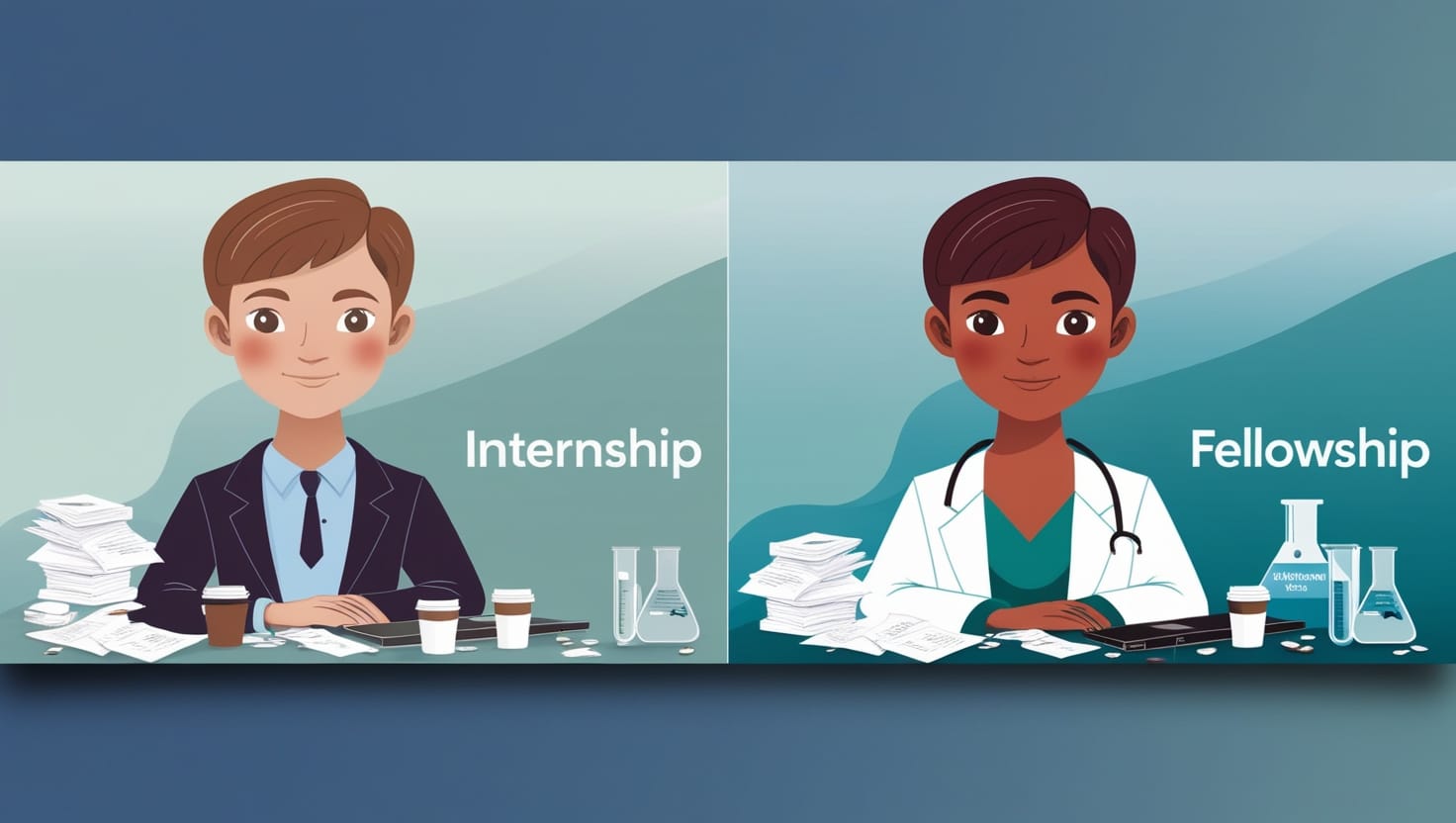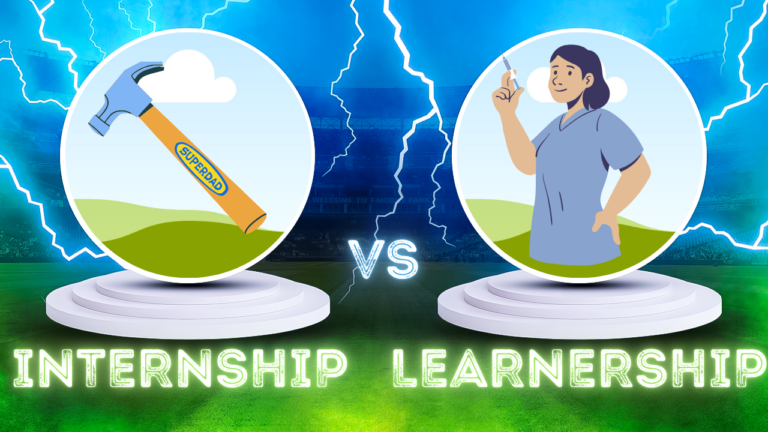Internship vs Fellowship Compared : 5 Key Differences and Similarities 2025
In today’s competitive job market, gaining practical experience and specialized knowledge is crucial for career advancement. Two popular avenues for achieving this are internship vs fellowship. While both offer valuable opportunities for professional growth, they have distinct characteristics and serve different purposes.
An internship is typically a short-term work experience offered by companies or organizations to students or recent graduates. It provides hands-on exposure to a particular industry or field, allowing participants to apply classroom knowledge in real-world settings. Fellowships, on the other hand, are generally more advanced opportunities that focus on specialized training, research, or professional development. They often cater to graduates, professionals, or those with specific expertise.
Internships Explained
Internships serve as a critical bridge between academic learning and professional practice, offering a unique blend of experiential education and career exploration. Let’s delve deeper into the multifaceted world of internships.
Definition and Purpose
At its core, an internship is a structured, time-limited work experience designed to provide practical insights into a specific industry or role. Unlike traditional employment, internships prioritize learning and skill development over productivity. They offer a safe space for novices to apply theoretical knowledge, make mistakes, and grow professionally under guided supervision.
The primary purposes of internships include:
- Skill acquisition in real-world settings
- Network building within the chosen industry
- Career path exploration and validation
- Resume enhancement
- Potential pathways to full-time employment
Types of Internships
The internship landscape is diverse, catering to various needs and circumstances:
- Paid vs. Unpaid: While paid internships are becoming increasingly common due to ethical considerations and labor laws, unpaid internships still exist, particularly in non-profit sectors. Paid internships often correlate with higher job offer rates and starting salaries post-graduation.
- For-credit vs. Non-credit: Some educational institutions offer academic credit for internships that meet specific criteria. These typically require additional academic components like reflective essays or research projects. Non-credit internships, while not contributing to degree requirements, still provide valuable experience.
- Summer, Semester, or Year-long: The duration of internships can vary significantly. Summer internships, often full-time, allow for deep immersion without conflicting with academic schedules. Semester-long internships, usually part-time, enable students to balance work and study simultaneously. Year-long internships, less common but growing in popularity, offer extended learning opportunities and often lead to smoother transitions into full-time roles.
Typical Duration and Time Commitment
Internship durations can range from a few weeks to over a year. Short-term internships (4-12 weeks) are common in fast-paced industries or for specific projects. Medium-term internships (3-6 months) allow for deeper engagement and skill development. Long-term internships (6-12+ months) are often found in research-intensive fields or industries with complex learning curves.
Time commitments vary:
- Full-time: 35-40 hours per week, common in summer internships
- Part-time: 10-20 hours per week, typical for semester-long internships
- Flexible: Project-based with deadlines rather than fixed hours
Target Audience
While internships predominantly target students and recent graduates, the demographic is expanding. Traditional interns include:
- Undergraduate students (typically juniors and seniors)
- Graduate students seeking industry exposure
- Recent graduates transitioning into the workforce
Emerging trends show internships catering to:
- Career changers exploring new industries
- Professionals re-entering the workforce after a hiatus
- High school students in specialized programs
Common Industries Offering Internships
While internships exist across almost all sectors, some industries have more structured and abundant offerings:
- Technology and Software Development
- Finance and Banking
- Marketing and Advertising
- Media and Communications
- Healthcare and Biotech
- Non-profit and Social Services
- Government and Public Policy
- Engineering and Manufacturing
- Entertainment and Creative Arts
- Education and Research
Each industry tailors internships to its specific needs, ranging from coding bootcamps in tech firms to policy analysis in think tanks. The proliferation of remote internships is further democratizing access, allowing participants to engage with organizations regardless of geographical constraints.
Further Reading:
- Internship vs Externship – Understand the Difference
- Internship vs Apprenticeship – Key Differences and Similarities
Fellowships Explained
Fellowships represent a unique opportunity for advanced learning, research, and professional development. Let’s explore the various aspects of fellowships in depth.
Definition and Purpose
A fellowship is a merit-based award that provides funding, resources, and opportunities for individuals to pursue specialized training, conduct research, or engage in professional development. Unlike internships, fellowships often target more experienced individuals and focus on advancing knowledge in a particular field or addressing specific societal challenges.
The primary purposes of fellowships include:
- Advancing research and innovation in specialized fields
- Developing leadership skills in chosen professions
- Promoting cross-cultural understanding and international cooperation
- Addressing complex societal issues through focused projects
- Fostering personal and professional growth in high-potential individuals
Types of Fellowships
Fellowships come in various forms, each designed to serve specific goals and audiences:
Academic Fellowships: These fellowships support scholarly pursuits within academic institutions. They often provide funding for graduate studies, postdoctoral research, or visiting scholar positions. Academic fellowships may cover tuition, living expenses, and research costs.
Professional Fellowships: Aimed at working professionals, these fellowships offer opportunities for career advancement, skill development, or career transitions. They may involve placements in organizations, intensive training programs, or self-directed projects under mentorship.
Research Fellowships: These fellowships fund independent research projects in various fields, from hard sciences to humanities. They often provide resources, lab access, and mentorship to support innovative research endeavors.
Public Service Fellowships: Focused on addressing societal challenges, these fellowships place individuals in government agencies, non-profits, or community organizations. They aim to develop future leaders in public service and policy-making.
Typical Duration and Time Commitment
Fellowship durations vary widely based on their type and purpose:
Short-term Fellowships: Lasting from a few weeks to a few months, these intensive programs often focus on specific skills or projects. They may involve summer institutes, workshops, or brief placements in organizations.
Medium-term Fellowships: Running from six months to a year, these fellowships allow for deeper engagement with a field or project. They often align with academic years or organizational fiscal cycles.
Long-term Fellowships: Spanning one to three years or more, these fellowships support extensive research projects, complete degree programs, or long-term professional development initiatives.
Time commitments for fellowships are typically full-time, requiring fellows to dedicate themselves entirely to the program’s objectives. However, some professional fellowships may offer part-time options for working individuals.
Target Audience
Fellowships cater to a wide range of individuals at various career stages:
- Graduate students pursuing advanced degrees
- Recent Ph.D. graduates seeking postdoctoral research opportunities
- Mid-career professionals looking for specialized training or career transitions
- Established experts aiming to conduct innovative research or lead significant projects
- Emerging leaders in various fields, including public service, arts, and sciences
Common Fields and Organizations Offering Fellowships
Fellowships span a broad spectrum of disciplines and sectors:
Academia and Research Institutions Universities, research centers, and think tanks offer fellowships to support scholarly work and innovation across disciplines.
Government and Public Policy Agencies at local, national, and international levels provide fellowships to develop future leaders and address policy challenges.
Non-profit and Social Impact Organizations: These fellowships focus on addressing societal issues, from education and healthcare to environmental conservation and human rights.
Scientific and Technological Institutes Research-focused fellowships in STEM fields drive innovation and scientific advancement.
Arts and Cultural Institutions Fellowships in these areas support creative endeavors, cultural preservation, and artistic development.
International Organizations Global bodies like the UN, WHO, and World Bank offer fellowships to promote international cooperation and development.
Private Foundations: Many philanthropic organizations fund fellowships aligned with their missions, spanning various fields and objectives.
Internship vs Fellowship – Key Differences

While internships and fellowships both offer valuable professional experiences, they differ in several key aspects. Understanding these differences is crucial for individuals seeking the most appropriate opportunity for their career stage and goals.
Purpose and Focus
Internships: Career Exploration and Skill Development Internships primarily serve as introductory experiences to specific industries or roles. Fellowships: Specialized Training and Advanced Contributions Fellowships, on the other hand, are designed for more focused and advanced pursuits
| Internship | Fellowship |
|---|---|
| Providing hands-on, entry-level work experience | Conducting in-depth research or specialized projects |
| Exposing interns to various aspects of a profession or industry | Developing expertise in a specific field or discipline |
| Developing basic professional skills and workplace etiquette | Contributing to innovative solutions for complex problems |
| Helping individuals determine if a particular career path aligns with their interests and abilities | Advancing knowledge or practice in a particular area |
| Fostering leadership skills within a chosen field |
Application Process and Eligibility
Internships: Accessible Entry Points The application process for internships is generally less rigorous.
Fellowships: Competitive and Selective Fellowship applications are usually more demanding and selective.
| Internship | Fellowship |
|---|---|
| Often open to current students or recent graduates | May require advanced degrees or significant professional experience |
| May require a resume, cover letter, and academic transcripts | Often involve detailed project proposals or research plans |
| Sometimes involve a basic interview process | Frequently require letters of recommendation from experts in the field |
| Typically do not require extensive prior experience in the field | May include multiple rounds of interviews or presentations |
| Often have a more extensive and competitive selection process |
Compensation and Benefits
Internships: Variable Remuneration Compensation for internships can vary widely.
Fellowships: Comprehensive Support Fellowships typically provide more substantial financial and professional support
| Internship | Fellowship |
|---|---|
| Some internships are unpaid, particularly in non-profit sectors | Often offer generous stipends or salaries |
| Paid internships often offer hourly wages or modest stipends | Frequently include additional funding for research, travel, or project expenses |
| May or may not include benefits like health insurance or paid time off | May provide comprehensive benefits packages |
| Sometimes offer academic credit instead of or in addition to payment | Sometimes include housing allowances or other living expense support |
| Often offer professional development funds and opportunities |
Level of Independence and Responsibility
Internships: Structured Guidance Internships usually involve more direct supervision and structured tasks.
Fellowships: Autonomous Pursuits Fellowships typically offer greater autonomy and self-direction
| Internship | Fellowship |
|---|---|
| Regular oversight and direction from supervisors | Often involve independent research or project management |
| Assigned tasks and projects within a team structure | Require self-motivation and the ability to work with minimal supervision |
| Focus on learning and executing basic professional responsibilities | Focus on producing original work or leading initiatives |
| Gradual increase in independence as skills develop | May involve mentorship, but with an emphasis on collegial relationships rather than direct supervision |
Career Stage Applicability
Internships: Early Career Stepping Stones Internships are typically geared towards individuals at the beginning of their professional journeys.
Fellowships: Advanced Career Catalysts Fellowships cater to individuals at various stages of their careers, often more advanced.
| Internship | Fellowship |
|---|---|
| Ideal for students still completing their degrees | Suitable for graduate students and post-doctoral researchers |
| Beneficial for recent graduates entering the job market | Valuable for mid-career professionals seeking specialization or transition |
| Useful for those exploring career changes at an entry level | Applicable to established experts looking to pursue innovative projects or research |
Internship vs Fellowship- Similarities

While internships and fellowships have distinct characteristics, they also share several important similarities. Understanding these common elements can help individuals appreciate the value of both types of opportunities in career development.
Professional Development Opportunities
Skill Enhancement Both internships and fellowships provide platforms for developing crucial skills:
- Technical skills specific to the industry or field
- Soft skills such as communication, teamwork, and problem-solving
- Time management and organizational skills
- Adaptability and learning agility in professional settings
Mentorship and Guidance Participants in both programs often benefit from mentorship:
- Access to experienced professionals in the field
- Opportunities for one-on-one guidance and feedback
- Exposure to different leadership styles and professional approaches
- Support in navigating career decisions and challenges
Networking Within Chosen Field
Building Professional Connections Both internships and fellowships facilitate networking:
- Interaction with professionals at various career stages
- Participation in industry events and conferences
- Access to alumni networks of the host organization
- Opportunities to collaborate on projects with diverse teams
Industry Exposure Participants gain valuable insights into their chosen fields:
- Understanding of industry trends and challenges
- Exposure to different roles and career paths within the field
- Opportunities to observe and participate in professional practices
- Insight into organizational cultures and work environments
Potential for Future Career Advancement
Career Trajectory Impact Both experiences can significantly influence career paths:
- Enhanced resume and professional profile
- Potential for strong letters of recommendation
- Increased competitiveness in the job market
- Opportunities for continued employment or collaboration with the host organization
Skill Application and Refinement Internships and fellowships both provide practical experience:
- Opportunities to apply theoretical knowledge in real-world settings
- Chances to identify areas for further skill development
- Development of a professional portfolio or body of work
- Refinement of career goals based on hands-on experience
Time-Limited Experiences
Structured Duration Both internships and fellowships typically have defined timeframes:
- Clear start and end dates, allowing for focused engagement
- Opportunities to achieve specific goals within a set period
- Ability to plan for future career steps or educational pursuits
- Potential for extension or conversion to long-term roles in some cases
Intensive Learning Periods The time-limited nature fosters accelerated growth:
- Concentrated periods of learning and development
- Motivation to maximize the experience within the given timeframe
- Opportunities for rapid skill acquisition and professional growth
- Defined milestones and objectives to achieve during the program
Opportunity to Gain Practical Skills and Knowledge
Hands-On Learning Both experiences emphasize practical application:
- Direct involvement in projects and tasks relevant to the field
- Opportunities to use industry-standard tools and technologies
- Exposure to real-world challenges and problem-solving scenarios
- Development of a practical understanding of theoretical concepts
Industry-Specific Knowledge Participants gain in-depth insights into their chosen fields:
- Understanding of industry-specific terminology and practices
- Exposure to current trends, innovations, and challenges in the field
- Opportunities to contribute to ongoing projects or research
- Development of specialized knowledge that complements academic learning
Choosing Between an Internship and Fellowship
Deciding between an internship and a fellowship can be challenging, as both offer valuable opportunities for professional growth. This section will guide you through the key factors to consider, essential questions to ask yourself, and effective research strategies to make an informed decision.
INTERNSHIP VS FELLOWSHIP WHICH IS BETTER?

When considering which is “better” between internships and fellowships, it’s important to recognize that the answer depends entirely on individual circumstances and career goals. Internships might be the superior choice for those seeking to explore different career paths, gain initial work experience, or foot in the door of a particular industry. They’re typically more suitable for students or recent graduates. Fellowships, however, might be the better option for those with a clearer career direction, seeking to specialize in a particular area, or looking to make significant contributions to their field. They’re often more appropriate for graduate students, researchers, or mid-career professionals looking to pivot or advance their careers.
The future of both internships and fellowships looks promising, with trends towards remote opportunities, increased focus on diversity and inclusion, interdisciplinary experiences, and flexible program structures. These developments are making these valuable experiences more accessible and relevant in our rapidly changing professional landscape.
Factors to Consider
Career Goals and Current Stage
Your career aspirations and current professional stage play a crucial role in determining which opportunity is more suitable. Internships are typically ideal for those in the early stages of their career, seeking to gain broad exposure to an industry or role. They offer a chance to explore different career paths and develop foundational skills.
Fellowships, on the other hand, are more appropriate for individuals with a clearer career direction, often at a more advanced stage. They provide opportunities for specialization, in-depth research, or focused skill development in a particular area of interest.
Field of Interest
Consider the nature of your chosen field and how it aligns with internship or fellowship opportunities. Some industries, such as technology or finance, have well-established internship programs that serve as primary entry points for new talent. Other fields, particularly in academia or specialized research areas, may place greater emphasis on fellowships for advancing knowledge and expertise.
Desired Level of Specialization
Reflect on whether you’re seeking broad exposure or specialized experience. Internships generally offer a wider view of an organization or industry, allowing you to explore various aspects of a profession. Fellowships typically provide a more focused, in-depth experience in a specific area, often involving advanced projects or research.
Financial Considerations
Evaluate your financial situation and the compensation offered by each opportunity. While many internships now offer competitive pay, some may still be unpaid or offer minimal stipends. Fellowships often provide more comprehensive financial support, including stipends, research funds, and sometimes additional benefits like health insurance or housing allowances.
Time Commitment
Consider the duration and intensity of the programs. Internships can range from a few weeks to several months, often aligning with academic schedules. Fellowships typically require a longer commitment, sometimes extending to a year or more, and often demand full-time engagement.
Questions to Ask Yourself When Deciding
When weighing your options, ask yourself the following questions:
- What stage am I at in my career, and what type of experience will best propel me forward?
- Am I looking to explore different career options, or do I have a specific area I want to delve into deeply?
- What skills do I need to develop, and which opportunity better aligns with those needs?
- How will this experience contribute to my long-term career goals?
- Can I commit to the time and potential relocation required for each opportunity?
- How will this choice impact my financial situation in the short and long term?
- What type of mentorship and networking opportunities am I seeking?
How to Research Opportunities
Effective research is key to finding the right internship or fellowship. Here are some strategies to help you in your search:
Utilize Online Resources
Explore dedicated internship and fellowship databases, job boards, and professional networking sites. Websites like LinkedIn, Indeed, and field-specific job boards often list a wide range of opportunities. For fellowships, look into databases maintained by professional associations, academic institutions, and government agencies.
Leverage University Resources
If you’re a student or recent graduate, your university’s career center can be an invaluable resource. They often have exclusive partnerships with organizations and access to alumni networks, which can lead to unique opportunities.
Network Within Your Field
Attend industry conferences, webinars, and networking events. Engage with professionals in your field through social media and professional associations. Personal connections can often lead to opportunities that aren’t publicly advertised.
Research Target Organizations
Identify organizations you’re interested in and explore their websites directly. Many companies and institutions have dedicated pages for internship or fellowship programs, often providing detailed information about application processes and program specifics.
Seek Informational Interviews
Reach out to professionals who have completed internships or fellowships in your area of interest. Their insights can provide valuable perspectives on the experiences and help you make a more informed decision.
Challenges and Considerations
While internships and fellowships offer numerous benefits, they also come with their own set of challenges and important considerations. Understanding these potential hurdles can help you better prepare for and navigate these experiences.
Work-Life Balance
Maintaining a healthy work-life balance can be challenging in both internships and fellowships, albeit for different reasons.
Internships often introduce students or recent graduates to the demands of a full-time work schedule for the first time. This transition can be jarring, especially when coupled with the pressure to perform and make a good impression. Interns may find themselves working longer hours to complete tasks or taking on additional responsibilities to stand out. The challenge lies in learning to manage time effectively, set boundaries, and still deliver high-quality work.
Fellowships, particularly research-focused ones, can blur the lines between work and personal life. The passion for a project or the pressure to produce significant results can lead to long, irregular hours. Fellows may find themselves consumed by their work, potentially neglecting other aspects of their lives. The key is to develop strategies for maintaining focus and productivity while also ensuring time for rest, personal interests, and relationships.
Financial Considerations
The financial aspects of internships and fellowships require careful consideration and planning.
For internships, the landscape is varied. While many companies now offer paid internships, some industries still have unpaid positions, particularly in non-profit sectors or highly competitive fields. Unpaid internships can create significant financial strain, especially if they require relocation or are in expensive urban areas. Even paid internships may offer modest stipends that barely cover living expenses. Prospective interns need to carefully evaluate their financial situation, consider part-time work options if necessary, and explore any available financial aid or scholarships.
Fellowships generally offer more comprehensive financial support, but challenges can still arise. The stipends provided, while often generous, may be less than what one could earn in a regular job in the same field. For those transitioning from full-time employment to a fellowship, this could mean a temporary reduction in income. Additionally, some fellowships may have restrictions on additional employment or earning outside income. Fellows need to budget carefully, considering both the duration of the fellowship and any post-fellowship transition period.
Potential for Exploitation in Internships
The potential for exploitation in internships is a serious concern that requires vigilance and awareness.
Some organizations may view interns as a source of free or cheap labor, assigning them menial tasks with little educational value or professional development opportunities. This not only undermines the purpose of the internship but can also be demoralizing for the intern. In extreme cases, interns might find themselves in situations where they’re essentially doing the work of a full-time employee without appropriate compensation or recognition.
To mitigate this risk, prospective interns should thoroughly research potential employers, seek out reviews or feedback from previous interns, and carefully review the internship description and contract. It’s important to have a clear understanding of the expected tasks, learning objectives, and supervision before accepting a position. If exploitation occurs, interns should be aware of their rights and the appropriate channels for reporting such issues, whether within the organization or to relevant educational institutions or labor authorities.
Balancing Fellowship Commitments with Other Responsibilities
Fellows often face the challenge of balancing their fellowship commitments with other personal or professional responsibilities.
For academic fellowships, this might mean juggling research or teaching duties with personal studies or dissertation work. Professional fellowships might require balancing project work with ongoing responsibilities in one’s regular job or profession. The intensive nature of many fellowship programs can make it difficult to maintain other commitments, whether they’re related to family, community involvement, or personal projects.
Successful navigation of this challenge often requires excellent time management skills, clear communication with fellowship supervisors and other stakeholders, and a willingness to reassess and adjust priorities as needed. Fellows may need to temporarily scale back on other commitments or find creative ways to integrate their fellowship work with their other responsibilities.
Adjusting to New Environments and Expectations
Both interns and fellows often find themselves in new and challenging environments, which can require significant adjustment.
For interns, this might mean adapting to their first professional work environment, learning to navigate office politics, or adjusting to the culture of a particular industry. The learning curve can be steep, and the pressure to quickly assimilate and perform can be stressful.
Fellows, particularly those in international programs or interdisciplinary fields, may face even more dramatic shifts. They might need to adapt to new cultural norms, different academic or professional standards, or unfamiliar research methodologies. The high expectations placed on fellows, often seen as experts or future leaders in their field, can add to the pressure of this adjustment period.
In both cases, the key to success lies in maintaining an open mind, being willing to ask for help and guidance, and viewing the adjustment period as an integral part of the learning experience. Building a support network, whether through peer groups, mentors, or professional associations, can also be invaluable in navigating these transitions.
Future Trends for Internship vs Fellowship
The landscape of internships and fellowships is continuously evolving, shaped by technological advancements, changing workforce dynamics, and global events. Understanding these trends can help both organizations and participants prepare for the future of these valuable professional development opportunities.
Remote Internships and Fellowships
The global shift towards remote work, accelerated by recent events, has had a profound impact on internships and fellowships. Remote opportunities are becoming increasingly common and are likely to remain a significant part of the landscape even as in-person work resumes.
For internships, this trend opens up possibilities for students and recent graduates to work with organizations regardless of geographical constraints. Companies can now tap into a global talent pool, and interns can gain experience with international firms without the need for relocation. However, this shift also presents challenges in providing the full immersive experience traditionally associated with internships. Organizations are developing innovative ways to foster company culture, facilitate mentorship, and ensure meaningful work experiences in virtual environments.
Fellowships are also adapting to remote formats, particularly in research-based and academic fields. Virtual collaborations, online conferences, and digital research tools are enabling fellows to conduct their work from diverse locations. This trend is especially beneficial for international fellowships, making them more accessible to a wider range of participants. However, it also requires fellows to develop strong self-motivation and virtual collaboration skills.
As this trend continues, we can expect to see hybrid models emerge, combining elements of remote and in-person experiences to maximize the benefits of both approaches.
Increasing Focus on Diversity and Inclusion
There is a growing emphasis on diversity, equity, and inclusion in both internship and fellowship programs. Organizations are recognizing the importance of creating opportunities for underrepresented groups and fostering more inclusive environments.
For internships, this trend is manifesting in several ways. Companies are expanding their recruitment efforts to reach a more diverse pool of candidates, partnering with organizations that focus on underrepresented groups in various fields. There’s also an increased focus on creating inclusive workplace cultures that support interns from all backgrounds. Additionally, more organizations are offering paid internships to ensure that these opportunities are accessible to students regardless of their financial situation.
In the realm of fellowships, there’s a push to diversify not only the pool of fellows but also the types of projects and research being funded. Many fellowship programs are now explicitly seeking to support work that addresses issues of equity and inclusion within various fields. There’s also an increased emphasis on providing mentorship and support structures to help fellows from underrepresented backgrounds succeed and advance in their careers.
Interdisciplinary Opportunities
The complex challenges of the modern world often require interdisciplinary approaches, and this is reflected in the evolving nature of internships and fellowships.
Internship programs are increasingly offering experiences that span multiple departments or disciplines within an organization. This trend allows interns to gain a more holistic understanding of how different aspects of a business or field interact. For example, a marketing intern might also get exposure to data analytics, or an engineering intern might work on projects related to sustainability.
Fellowships are at the forefront of this trend, with many programs actively seeking projects that bridge traditional disciplinary boundaries. There’s a growing recognition that breakthrough innovations often occur at the intersection of different fields. As a result, we’re seeing more fellowships that encourage collaboration between fellows from diverse academic or professional backgrounds. This might involve partnerships between arts and sciences, technology and humanities, or business and social sciences.
Changes in Duration and Structure
The traditional models of internships and fellowships are being reimagined to better suit the needs of both participants and organizations.
For internships, we’re seeing a move away from the standard summer internship model. Many companies are offering micro-internships or project-based internships that can be completed in a matter of weeks. These shorter-term opportunities allow students to gain experience with multiple organizations or in various roles, helping them make more informed career decisions. At the same time, some organizations are extending internship durations, creating semester-long or even year-long programs that provide a more in-depth experience.
Fellowships are also experimenting with different durations and structures. While traditional long-term fellowships remain valuable, there’s a growing trend towards shorter, more intensive fellowship experiences. These might take the form of summer institutes, accelerator programs, or focused research sprints. Additionally, some fellowship programs are adopting more flexible structures that allow fellows to customize their experience based on their specific goals and projects.
As the nature of work continues to evolve, we can expect further innovations in the duration and structure of both internships and fellowships, with an emphasis on flexibility and customization to meet diverse needs and goals.
Conclusion
As we’ve explored throughout this comprehensive comparison, both internships and fellowships offer valuable opportunities for professional growth and career advancement. These experiences provide unique pathways for individuals to gain practical skills, expand their networks, and contribute to their chosen fields.
Internships serve as crucial stepping stones for those in the early stages of their careers, offering broad exposure to industries and roles. They provide hands-on experience that bridges the gap between academic learning and professional practice. Fellowships, on the other hand, cater to more advanced professionals or those seeking specialized experiences. They offer deep dives into specific areas of study or practice, often involving research, leadership development, or innovative projects.
Ultimately, whether you choose an internship or a fellowship, the key is to approach the opportunity with clear goals, an open mind, and a commitment to learning and growth. Both can provide invaluable experiences that shape your professional journey and contribute to your long-term success. By carefully considering your current career stage, future aspirations, and the specific opportunities available, you can make an informed decision that best aligns with your professional development needs.










